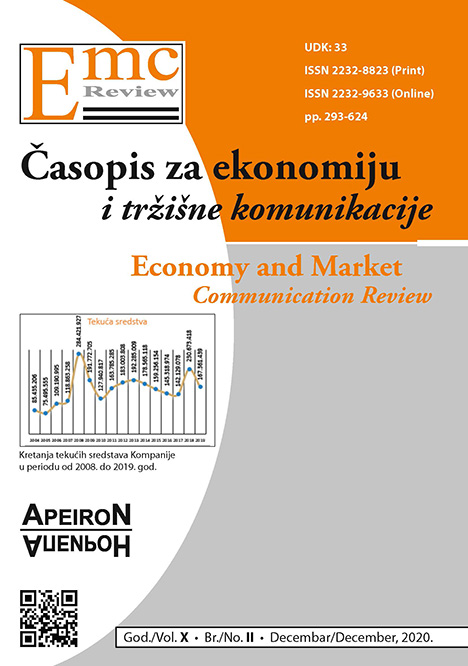ANALYSIS OF THE FACTOR OF HOUSEHOLD SAVINGS IN BIH BY APPLICATION OF ECM METHODOLOGY
DOI:
https://doi.org/10.7251/EMC2002338DJAbstract
Savings as an alternative source of capital, in the opinion of most economists, are a much more reliable and rational source of investment funds than others. Therefore, the aim of this research is to determine what factors can drive domestic household savings with further repressions to overall economic growth. This research examined the impact of macroeconomic and financial factors on household savings based on quarterly data from the BiH Agency for Statistics and the Central Bank of Bosnia and Herzegovina for the period 2000-2016. For this purpose, seasoning of variables was done using X-13 ARIMA and TRAMO / SEATS. The stationarity of seasonally adjusted variables was examined through: the extended Dickey-Fuller unit root test, the Phillips-Perrontest unit root test, and the Kwaitkowski-Phillips-Schmidt-Shin stationarity test. The model included only non-stationary first order integration variables, which are also cointegrated, which is a condition for applying the error correction method (ECM). The application of the ECM methodology first required determining the appropriate number of lag in the VAR model and then applying the Johansen cointegration test. The following were used as independent variables in ECM: industrial production, government expenditure in% of GDP, money supply (M2) in% of GDP, foreign trade balance in% of GDP, current account balance in% of GDP, deposit population interest rate and unemployment rate. The variables included are based on ECM methodology criteria, which is the same order of integration and cointegration. Among the long-run interdependence ratios, only general government expenditure ratios in% of GDP, foreign trade balance in% of GDP and current account balance in% of GDP proved to be statistically significantly different from zero. The first two coefficients have a positive sign, while the impact of the current account balance in the gross domestic product is negative. A one percent increase in the share of general government expenditures and foreign trade balance in Gross Domestic Product will in the long run lead to an increase in the household savings rate by 4.1% and 3.5% respectively. The error correction coefficient (EC (-1)) in the short-term part of the model, which measures the rate of equilibrium adaptation in the dynamic model, is with the expected negative sign, but is not statistically significant. The high value of the adjusted coefficient of determination, 0.385, suggests that almost 39% of variations in household savings are explained by variations in the set of independent variables included in the ECM model. The obtained research findings can be significant indicators for adequate monetary and fiscal policy measures in BiH, and can be indicators for the overall macroeconomic policy of the country.
